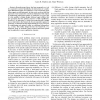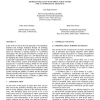134 search results - page 8 / 27 » Cooperative Game Theory for Distributed Spectrum Sharing |
UAI
2000
15 years 1 months ago
2000
Cooperative games are those in which both agents share the same payoff structure. Valuebased reinforcement-learning algorithms, such as variants of Q-learning, have been applied t...
CDC
2009
IEEE
15 years 4 months ago
2009
IEEE
—Recently, game theory has been proposed as a tool for cooperative control. Specifically, the interactions of a multiagent distributed system are modeled as a non-cooperative ga...
WSC
2000
15 years 1 months ago
2000
In this work we want to show the importance of visualization, interfaces and re-design techniques through 3D modeling, animations and VRML in the developing of the simulation game...
109
click to vote
CORR
2008
Springer
14 years 11 months ago
2008
Springer
Abstract-- This paper introduces a novel concept from coalitional game theory which allows the dynamic formation of coalitions among wireless nodes. A simple and distributed merge ...
105
click to vote
GLOBECOM
2006
IEEE
15 years 5 months ago
2006
IEEE
Abstract— In this paper, we consider the problem of detecting intrusions initiated by cooperative malicious nodes in infrastructure-based networks. We achieve this objective by s...


